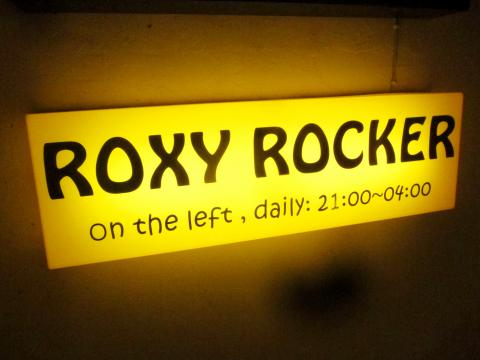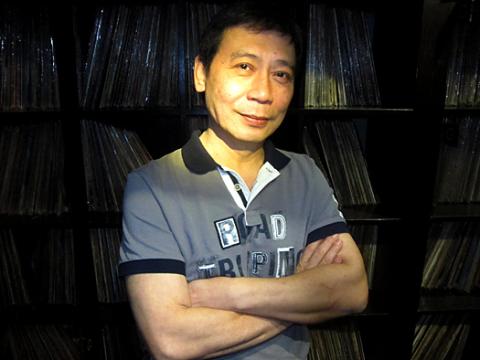The Roxy chain of bars and clubs has been a mainstay for rock and roll and an expat hangout in Taipei for more than three decades. Now it is slowly being pressured out of its longtime stronghold in the Shida neighborhood by the city government. Roxy 99, a late night pub operating for 15 years, will move to a new location on Fuxing South Road in August as the result of a string of noise complaints. Roxy Rocker, a bar with a stage for live music, has cancelled all performances by foreign nationals after inspections by Taipei City’s Department of Labor in early May.
Roxy’s owner Ling Wei (凌威), who has been running bars for more than three decades, finds the situation unprecedented. He opened his first bar, a music pub called AC/DC Rock House near National Taiwan University in 1982 and four years later opened a second pub called Roxy. He has been running bars, clubs and live music venues ever since, housing his collection of more than 10,000 vinyl records in a special listening lounge in one of the newer venues, Roxy Rocker. His clientele has always been a mix of locals and expats. Yet in all his years of doing business, Ling has never witnessed the kind of government scrutiny he is experiencing now.
Last August, repeated fines caused Ling to close Jr. Cafe, a 24-hour bar and restaurant in the heart of the Shida student district. The bar had operated without complaints for 18 years before it was targeted last year by the Shidahood Self-help Association (師大三里里民自救會), an advocacy group of residents that opposed a variety of businesses, specifically those selling alcohol. The Association hung banners above Jr. Cafe and other nearby businesses accusing them of noise and air pollution. Ling countered with a banner of his own, calling the association a group of “fake neighbors.”

Photo: David Frazier
“I had been there all those years and never had one complaint from my upstairs neighbors. The Self-help Association claimed to represent my neighbors, but that was completely fake. My neighbors and I got along very well,” said Ling.
Ling says the trouble at Roxy 99 started after Jr. Cafe closed.
“I don’t know who the complaints are coming from,” said Ling. “Roxy 99 is on a six-lane road and in a commercial building with no residential tenants. It has been there for 15 years. Who are we bothering?”

Photo: David Frazier
Shidahood is a well-organized lobbying group that has targeted businesses by generating huge volumes of complaints relating to noise, kitchen exhaust, signs that stick too far out into roadways, illegally subdivided lots and various other violations. Some businesses have received multiple complaints on a daily basis for months. From the beginning of this year, Taipei City has also lowered the threshold for noise violations.
When I asked Ling if he thought the Shidahood Association had targeted Roxy 99, he replied, “We cannot say. But I am tired of fighting it. We have to move. That is for sure.”
Roxy Rocker first experienced trouble from May 3, when two officials from the Taipei City Department of Labor appeared to check the performance permit of a band with one foreign member.
Though the law is seldom enforced, all foreigners performing music in Taiwan need special work permits. The permits require proof of professional activities — such as CDs, fliers or media coverage — from outside of Taiwan, so they are not easy to get for expats who only live and play locally.
Ling calls the law “a dinosaur” and believes his current trouble to be an “isolated incident.”
“As far as I know, no other performance venues have had any problems,” he said.
However, Ling believes the implications could be severe. “These were not professional performers. This was an amateur, unpaid performance, but they are treating it as a professional performance, like a performance in Taipei Arena,” he says. “Amateur performance is the most basic level of the music scene. If you close the door on foreigners performing there, how are you going to say you have a vibrant cultural environment?”
Roxy currently operates Roxy 99, Roxy Rocker and Roxy Mini. Beyond the impending move by Roxy 99, by late summer Ling plans to open a jazz-themed bar and a new live house with a capacity of 300-400.
Music on campus
Campus rock festivals can be fun, especially when they are free, open to the general public, and have a decent lineup, as does an event curiously titled, “Is My Future a Dream?” to be held this Sunday at National Chengchi University in Muzha. The question posed by the event title seems open ended enough, but then we discover that the organizers are a group of college students from several local universities called the Desolation Club (荒漠俱樂部). They no doubt imagine a future of 12-hour work days in a fluorescent lit office making NT$25,000 a month, if they are lucky enough to find a job. For the moment, at least, they still have rock and roll. At the concert, there will be three stages with 18 bands, some of them quite notable. Sissy Chao (趙一豪), a legendary first wave Taiwanese rocker from the ’80s and ’90s who modeled his sound on Jim Morrison, will play alongside a slew of bands from the current generation, most of them playing various strains of postrock, post punk or indie pop. To get there, take the MRT to Muzha Station and then a bus, or else hoof it for the final kilometer.
Is My Future a Dream? music festival features Elephant Gym, Bowz Tiger, Insecteens, Frande, Sissy Chao & Double X, Orange Grass, Silent Toads, My Skin Against Your Skin, EggPlantEgg and others. It starts at noon on Sunday June 2 at National Chengchi University (國立政治大學), 64 Zhinan Rd, Sec 2, Taipei City (台北市文山區指南路二段64號). Admission is free.

Cheng Ching-hsiang (鄭青祥) turned a small triangle of concrete jammed between two old shops into a cool little bar called 9dimension. In front of the shop, a steampunk-like structure was welded by himself to serve as a booth where he prepares cocktails. “Yancheng used to be just old people,” he says, “but now young people are coming and creating the New Yancheng.” Around the corner, Yu Hsiu-jao (饒毓琇), opened Tiny Cafe. True to its name, it is the size of a cupboard and serves cold-brewed coffee. “Small shops are so special and have personality,” she says, “people come to Yancheng to find such treasures.” She

Late last month Philippines Foreign Affairs Secretary Theresa Lazaro told the Philippine Senate that the nation has sufficient funds to evacuate the nearly 170,000 Filipino residents in Taiwan, 84 percent of whom are migrant workers, in the event of war. Agencies have been exploring evacuation scenarios since early this year, she said. She also observed that since the Philippines has only limited ships, the government is consulting security agencies for alternatives. Filipinos are a distant third in overall migrant worker population. Indonesia has over 248,000 workers, followed by roughly 240,000 Vietnamese. It should be noted that there are another 170,000

In July of 1995, a group of local DJs began posting an event flyer around Taipei. It was cheaply photocopied and nearly all in English, with a hand-drawn map on the back and, on the front, a big red hand print alongside one prominent line of text, “Finally… THE PARTY.” The map led to a remote floodplain in Taipei County (now New Taipei City) just across the Tamsui River from Taipei. The organizers got permission from no one. They just drove up in a blue Taiwanese pickup truck, set up a generator, two speakers, two turntables and a mixer. They

Hannah Liao (廖宸萱) recalls the harassment she experienced on dating apps, an experience that left her frightened and disgusted. “I’ve tried some voice-based dating apps,” the 30-year-old says. “Right away, some guys would say things like, ‘Wanna talk dirty?’ or ‘Wanna suck my d**k?’” she says. Liao’s story is not unique. Ministry of Health and Welfare statistics show a more than 50 percent rise in sexual assault cases related to online encounters over the past five years. In 2023 alone, women comprised 7,698 of the 9,413 reported victims. Faced with a dating landscape that can feel more predatory than promising, many in